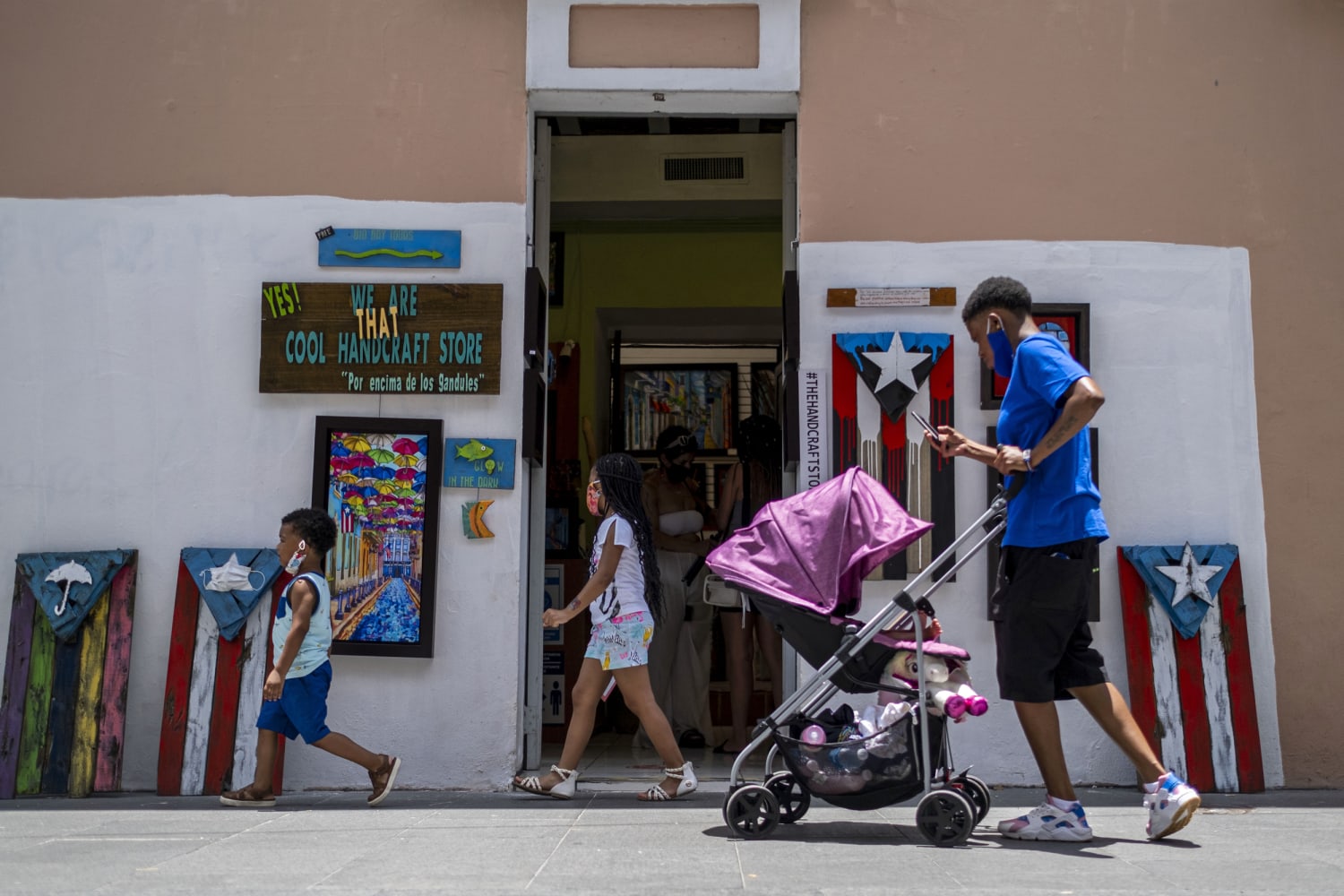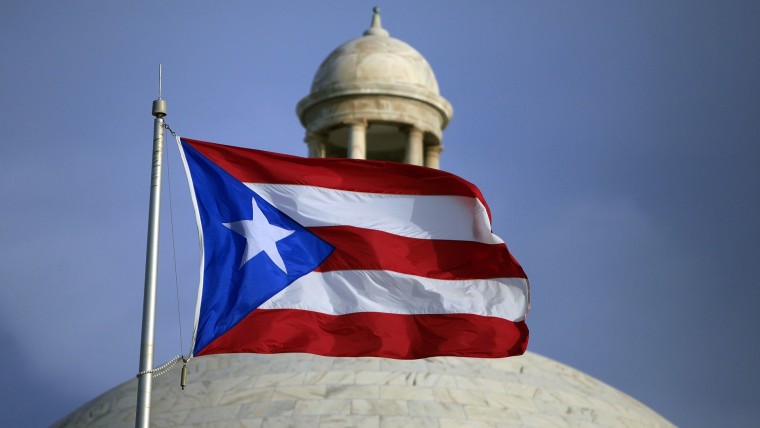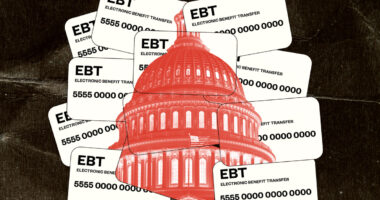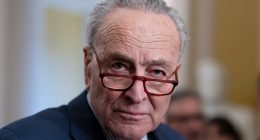Aurelis Aponte is anxiously waiting for the U.S. Supreme Court to hear a potential landmark case that will determine whether it’s constitutional to deny federal benefits to aging and disabled U.S. citizens living in Puerto Rico, though they can access them if they lived on the U.S. mainland.
Aponte’s daughter, Isabela, was born with seven major heart conditions in February 2017, just several months before Hurricane Maria devastated Puerto Rico.
After a month of living without power and unable to work, Aponte and her husband, Jonathan López, used the money they had left in their bank account to buy them and their two daughters plane tickets to Florida.
Aponte, 37, who worked as a supervisor at a physical therapy clinic, told NBC News she “never thought I would be refugee.” After arriving in Florida, a church helped Aponte access aid her family was eligible for, including hurricane-related aid, food stamps and Supplemental Security Income benefits, also known as SSI, for her daughter.
As a U.S. citizen with serious health conditions, Isabela qualified for SSI benefits, which help disabled, older and blind people who struggle financially. Three weeks after Aponte applied on behalf of her daughter, she started receiving the benefits, which helped the family with living expenses and medical bills.
“It puts us in a better position to help Isabela endure health conditions that don’t just go away,” Aponte said in Spanish.
After living out of hotel rooms for months and landing new jobs, Aponte and López were ready to settle in Orlando when they had to return to Puerto Rico to help care for Aponte’s mother, who was diagnosed with Alzheimer’s disease.
Once they went back to the U.S. territory, Isabela lost her SSI benefits.
According to the federal government, the U.S. is allowed to withhold SSI benefits from U.S. citizens depending on where they live.
The benefits are available to U.S. citizens living in the 50 states, the District of Columbia and the Northern Mariana Islands but not for those who live in Puerto Rico, the U.S. Virgin Islands, Guam and American Samoa.
“We returned to Puerto Rico aware of what we were going to lose because of this system, aware of how difficult it would be for us to move forward economically. But at the end of the day, we were talking about my mother,” Aponte said.
At a Supreme Court hearing Tuesday, the Justice Department is expected to argue in favor of reversing a U.S. Court of Appeals ruling from last year that deemed as “invalid” the practice of denying SSI benefits to Puerto Rican residents, stating the federal government failed to establish “a rational basis for the exclusion of Puerto Rico residents from SSI coverage.”
The arguments come as part of a case involving José Luis Vaello-Madero. Vaello-Madero lived in New York from 1985 until 2013, when he moved to Puerto Rico to care for his wife. He had begun receiving SSI benefits in 2012, when he was still in New York, until he was told in 2016 that he was ineligible after moving to Puerto Rico.
A year later, the Social Security Administration filed civil action against Vaello-Madero, demanding he pay over $28,000 in benefits he had received while living in Puerto Rico.
‘This injustice is causing me so much pain’
Aponte said her daughter’s benefits were taken away “for no good reason” as she gets ready to face more heart surgeries and a possible heart transplant in the future.
“The Isabela who has seven heart conditions, who belongs to a family that hit rock bottom despite working tirelessly to get back up, is the same Isabela living now in Luquillo, Puerto Rico,” Aponte said. “That’s why this injustice is causing me so much pain.”
According to Laura Esquivel, vice president of federal policy at the advocacy organization Hispanic Federation, Vaello-Madero’s case is the first of a series of lawsuits dealing with federal benefit disparities across U.S. territories to make it to the Supreme Court.
“This is an opportunity for the Supreme Court to finally right this historic wrong with a new legal precedent that makes it clear that unjustly denying any American their full rights is unconstitutional and indefensible,” Esquivel said.
About 700,000 people living in Puerto Rico would qualify for SSI benefits if the Supreme Court upholds the decision. That would mean a combined $1.8 billion to $2.4 billion annually for qualified Puerto Rico residents over the decade, according to the Social Security Administration. Nearly 44 percent of Puerto Ricans live in poverty.
Instead of SSI benefits, Puerto Rico has a local program called Aid to the Aged, Blind and Disabled. To qualify, people can’t earn more than $65 a month, compared with $750 monthly for SSI, The Associated Press reported in June. Those who qualify under Puerto Rico’s program get an average benefit of $77 a month, while SSI beneficiaries receive an average of $533 a month.
A legal precedent behind the disparity
A series of Supreme Court rulings from the early 1900s known as the Insular Cases have long served as legal precedent for rulings regarding Puerto Rico and other U.S. territories.
The Insular Cases were written by most of the Supreme Court justices who legalized racial segregation under Plessy v. Ferguson after Puerto Rico came under U.S. control following the Spanish-American War. In essence, the cases allowed Congress and the federal government to treat U.S. territories as foreign for domestic purposes and states for international purposes, particularly when it comes to funding public programs.
While Plessy v. Ferguson was overturned almost 60 years later in Brown v. Board of Education of Topeka, the Insular Cases have never been overturned.
Esquivel said she sees the Supreme Court case as “the possibility of a decision that supersedes the racist Insular Cases.”
Though President Joe Biden promised to “ensure residents of Puerto Rico have access to [SSI] benefits” during his presidential campaign, the Department of Justice is expected to argue before the Supreme Court on Tuesday that the denial of benefits to islanders is not unconstitutional.
In a statement in June, Biden said the Department of Justice “has a longstanding practice of defending the constitutionality of federal statutes, regardless of policy preferences.”
Biden said Puerto Ricans “should be able to receive SSI benefits” and called on Congress to amend the Social Security Act.
As part of its 57-page filing, the Department of Justice argues in favor of denying Puerto Rican residents SSI benefits because they “are generally exempt from most federal taxes, including the income tax, excise taxes, and estate and gift taxes.”
Puerto Ricans do pay federal payroll taxes and help fund public programs such as Medicare and Social Security.
Differences in taxation limit Puerto Ricans on the island in other ways, including the lack of voting representation in Congress and the inability to vote in U.S. presidential elections, among other restrictions when it comes to accessing federal safety net programs.
On Thursday, the Hispanic Federation and more than 60 other organizations from the U.S. and Puerto Rico sent a letter to Biden urging and his administration “to immediately withdraw the government’s appeals in the case of Vaello Madero from the Supreme Court.”
In an interview with NBC News, Puerto Rico Gov. Pedro Pierluisi said the way the Biden administration “went about this and the way that they are defending it is not right.”
“This program has nothing to do with whether you pay taxes or not. The vast majority, if not all, SSI beneficiaries do not pay federal income taxes,” mainly because their incomes are so low they aren’t required to file taxes, Pierluisi said. “It also is kind of arbitrary.”
If the Supreme Court doesn’t side with Puerto Ricans on the island, Pierluisi said, “I’m confident that Congress will.”
Lawmakers are looking to add language in the $1.75 trillion Build Back Better legislation, which is still being negotiated in Congress, to include Puerto Rico in the SSI program in the next two years.
“That’s not a done deal by any means,” Esquivel said, adding that congressional intervention still doesn’t solve the issue of the court precedents that allow differences in the way island and mainland Puerto Ricans get benefits.
A few other cases that speak to the same issue are currently stayed pending the Supreme Court’s final resolution on Vaello-Madero’s case, Esquivel said.
In the meantime, Aponte and López said they’re struggling to keep up with piling medical bills. As Aponte awaits the Supreme Court’s decision, she said she wants lawmakers and everyday Americans “to view Puerto Ricans with sensitivity because we really didn’t ask for this.”
“I wish I could tell you I’m exaggerating when I tell you I hide behind my bravery, my strength and my faith,” Aponte said. “For others to stop feeling apathy, I would invite anyone to walk in my shoes.”
Follow NBC Latino on Facebook, Twitter and Instagram.
Source: | This article originally belongs to Nbcnews.com











